|
|
|
Sort Order |
|
|
|
Items / Page
|
|
|
|
|
|
|
| Srl | Item |
| 1 |
ID:
191530
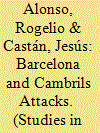

|
|
|
|
|
| Summary/Abstract |
This article analyses how counter terrorism policing before and after the August 2017 jihadi attacks in Catalonia was negatively affected by two factors: the Spanish policing model based on a decentralized security system and the independentist challenge posed by the Catalan Government. Firstly, the article assesses the political and legal framework vis-à-vis security in a quasi-federal democracy like Spain. Secondly, it analyzes how the police response to the jihadist threat was impacted by this multilayer system structured around a central government, seventeen autonomous regions, two autonomous cities, and over eight thousand local councils. Thirdly, the article examines how the challenge posed by independentists in the Autonomous region of Catalonia, who in 2017 attempted to break away from Spain in defiance of the Spanish Constitution, exacerbated the structural problems of the security system. It concludes that the combination of several factors in a particularly conflictive political environment led to the failure of counter terrorism policing on three levels: proactive, preventive, and reactive.
|
|
|
|
|
|
|
|
|
|
|
|
|
|
|
|
| 2 |
ID:
080369
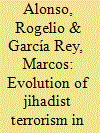

|
|
|
|
|
| Publication |
2007.
|
| Summary/Abstract |
Over the last few years, Moroccans have been disproportionately involved in jihadist terrorism. Morocco has been increasingly identified as one of the largest producers of terrorists and insurgents in Afghanistan, Iraq, and throughout Europe. This article examines the factors behind the emergence of jihadist terrorism in Morocco, and how this terrorist threat has gone beyond this country's borders. Three factors have contributed to this development: the influence of global jihad on potential Moroccan jihadists; the growing Islamization of the country; and deteriorating socioeconomic conditions. In analyzing these variables, special attention will be paid to the Casablanca terrorist attacks on May 16, 2003, marking the debut of suicide terrorism in Morocco. The article will also examine the principal counterterrorist initiatives Morocco has implemented in response to this threat.
|
|
|
|
|
|
|
|
|
|
|
|
|
|
|
|
| 3 |
ID:
075948


|
|
|
|
|
| Publication |
London, Routledge, 2007.
|
| Description |
vii, 228p.Hbk
|
| Standard Number |
9780415396103
|
|
|
|
|
|
|
|
|
|
|
|
Copies: C:1/I:0,R:0,Q:0
Circulation
| Accession# | Call# | Current Location | Status | Policy | Location |
| 052162 | 941.5082/ALO 052162 | Main | On Shelf | General | |
|
|
|
|
| 4 |
ID:
120322
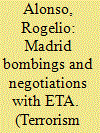

|
|
|
|
|
| Publication |
2013.
|
| Summary/Abstract |
This article analyzes the impact that two terrorism-related matters had on Spanish politics and electoral processes in the country. First, the article analyzes the terrorist attacks perpetrated by jihadists on March 11, 2004, three days before Spain's general election. The indiscriminate, lethal attacks caused a state of shock in the country, brought the election campaign to a sudden end, and led to the defeat of the party in power. Second, the article analyzes the negotiations entered into with the ETA terrorist organization by the new government during its first term, from 2004 to 2008. This controversial step, upheld by the Spanish government despite massive opposition by civil society and the main opposition party, failed to bring about the end of ETA. Both the Madrid attacks and the negotiations with ETA were responsible for the breakdown of the consensus in regard to terrorism that had existed among the main Spanish political parties. The article analyzes how both events generated an unprecedented level of polarization and tension among political parties and society from 2004 to 2008, and how each event had a different impact on the general elections held during that period. The period under examination provides an example of adversarial politics; terrorism was highly influenced by the management of both events by the main political players.
|
|
|
|
|
|
|
|
|
|
|
|
|
|
|
|
| 5 |
ID:
066042
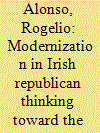

|
|
|
| 6 |
ID:
058971
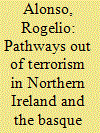

|
|
|
| 7 |
ID:
191466
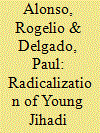

|
|
|
|
|
| Summary/Abstract |
This article analyses the radicalization of all of the five young offenders -aged between fourteen and eighteen years- who have been convicted in Spain between 2004 and 2019 of membership of a jihadist terrorist organization. It is based on: a) unprecedented access to the assessments of these youths produced by the Agency for the Reeducation and Reintegration of Young Offenders in the regional Government of Madrid; b) personal semi-structured interviews with the staff at this Agency responsible for their psycho-socio and educational intervention during their custodial measures; and c) judicial reports related to their cases. The article assesses the main features of the radicalization processes of these minors following a three-dimensional analysis at the micro, meso and macro level. It provides empirical evidence to test the validity of the main hypotheses on the causality of radicalization.
|
|
|
|
|
|
|
|
|
|
|
|
|
|
|
|
| 8 |
ID:
113535


|
|
|
|
|
| Publication |
2012.
|
| Summary/Abstract |
This article analyzes the main features of radical Islam in Spain and the role that Islamist radicalism plays in the radicalization of a significant minority of the Muslim population in Spain. It also examines the implications of the expansion of radical Islam on radicalization toward violence among segments of Spain's Muslim communities and on dynamics of social cohesion more broadly. The article argues that certain aspects of radical Islam strongly propel radicalization toward terrorism constituting early indicators of violent radicalization. The individuals on whom this ideology resonates and impact in a profound way are acutely vulnerable to violent radicalization.
|
|
|
|
|
|
|
|
|
|
|
|
|
|
|
|
| 9 |
ID:
060488
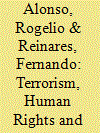

|
|
|
|
|
| Publication |
Jan 2005.
|
| Summary/Abstract |
Terrorism systematically violates human rights and disrupts basic political processes common to liberal democracies. Combating terrorism is thus necessary in order to protect these fundamental rights and maintain the well functioning of tolerant polities. However, state initiatives put in place to cope with terrorism may also damage human rights, even when these measures are formulated by elected accountable authorities and implemented in the context of open societies. Spain has precisely been among those European countries most affected by the wave of terrorism initiated more than three decades ago across western industrial societies, and thus where violations of fundamental rights as well as obstacles to the exercise of civil liberties as a consequence of such violence became particularly severe. Also, a case where effective rule of law was temporarily damaged in the fight against the ethnonationalist terrorism perpetrated by ETA (an acronym for Euskadi ta Askatasuna, meaning Basque Homeland and Freedom) but successfully restored by efforts from both state institutions, as a result of an effective division of power, and civil society. It is therefore an experience providing substantive knowledge and valuable insights on how to counter terrorism in accordance with the principles and procedures of democracy. Accordingly, this paper aims at a better understanding on the interrelated issues of terrorism, human rights and law enforcement in a context of political change.
|
|
|
|
|
|
|
|
|
|
|
|
|
|
|
|
| 10 |
ID:
148914
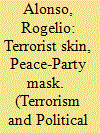

|
|
|
|
|
| Summary/Abstract |
The article analyses the political communication strategy adopted by Sinn Féin in order to legitimize the Provisional Irish Republican Army's (PIRA) terrorist campaign during their transition from violence into mainstream politics. Their endeavours to portray a triumphant republican movement in spite of the huge gap between strategic aims and achievements are examined. The political and social rehabilitation of violent Republicanism, and how their leaders have evolved from pariahs to celebrities, is also assessed. The role of the media and political elites, as well as the political discourse of the PIRA and Sinn Féin, is analysed in order to examine how the republican movement has tried to rewrite its past in an attempt to gain political and social legitimacy. Consequently, the myths reproduced by republicans to disguise their failures as historical compromises, reproducing a more benign interpretation of history which distorts the causes and consequences of terrorism, are critically assessed. The article will focus on the struggle for the legitimacy of the terrorist campaign and the propaganda system which, in the words of Garret FitzGerald (Irish Prime Minister between 1981 and 1987), has managed to turn the republican movement into the “peace party” despite murdering thousands of human beings.
|
|
|
|
|
|
|
|
|
|
|
|
|
|
|
|
| 11 |
ID:
156912
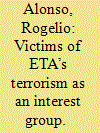

|
|
|
|
|
| Summary/Abstract |
This article responds to the following research questions: How and why have victims of ETA’s terrorism in Spain become an interest group with significant influence on the political and legislative agenda of the country. The evolution of the associative movement of victims of terrorism is assessed in order to explain the process by which their influence and impact on the political agenda has gradually grown throughout the years. It analyzes the transition from the isolation suffered by victims of terrorism in the early days of ETA’s campaign to the prominent social and political role played at later stages. The factors that motivate and explain their active role as interest groups are looked into, demonstrating different claims and interests with varying degrees of coherence and leverage. The relevancy of victims of terrorism within the anti-terrorist policies of various Spanish governments will be established, as well as the achievements and limitations of such a significant interest group.
|
|
|
|
|
|
|
|
|
|
|
|
|
|
|
|
| 12 |
ID:
147598
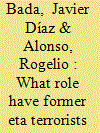

|
|
|
|
|
| Summary/Abstract |
This article responds to the following research question: what role have former Euskadi Ta Askatasuna (ETA) members played in counterterrorism and counterradicalization initiatives vis-à-vis the terror group in Spain? Our analysis of the role played by former ETA members so far demonstrates that only a minority of former ETA terrorists have disengaged from the terrorist organization and at the same time voiced some criticism of their past violent activities. Such a step, although a positive one, is part of a process that in most of the cases analyzed has to be deemed as incomplete due to deficits, some of them very significant, which considerably limit their effectiveness in countering terrorism and radicalization.
|
|
|
|
|
|
|
|
|
|
|
|
|
|
|
|
| 13 |
ID:
190936
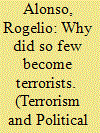

|
|
|
|
|
| Summary/Abstract |
This article responds to the following research question: if a large number of people experienced in Northern Ireland and the Basque Country the same root causes that increased the likelihood of becoming involved in terrorism, why did so few become terrorists? The article provides an exploratory study of the factors that prevented individuals from joining terrorist organizations in the United Kingdom and Spain, where intense campaigns of violence took place since the late sixties for four decades. The article is based on twenty-seven semi-structured in-depth interviews with men and women who refrained from resorting to terrorism despite sharing similar structural and personal features with those who decided to engage in terrorism. It identifies a combination of inhibitor factors that prevented individuals from following terrorist pathways despite sharing some predisposing risk factors with those who did engage in terrorism as members of organizations like the IRA, the UVF, the UFF and ETA. It also assesses why some types of radicalization developed into violence while others did not as a result of certain barriers.
|
|
|
|
|
|
|
|
|
|
|
|
|
|
|
|
|
|
|
|
|